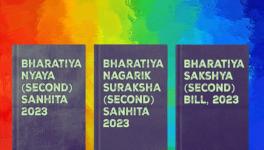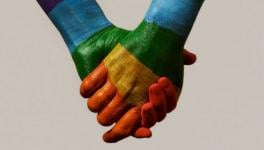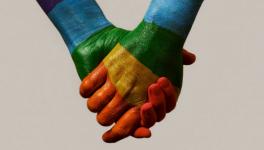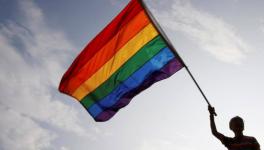Nepal Sets Historic Precedent, Legalises Same-Sex Unions
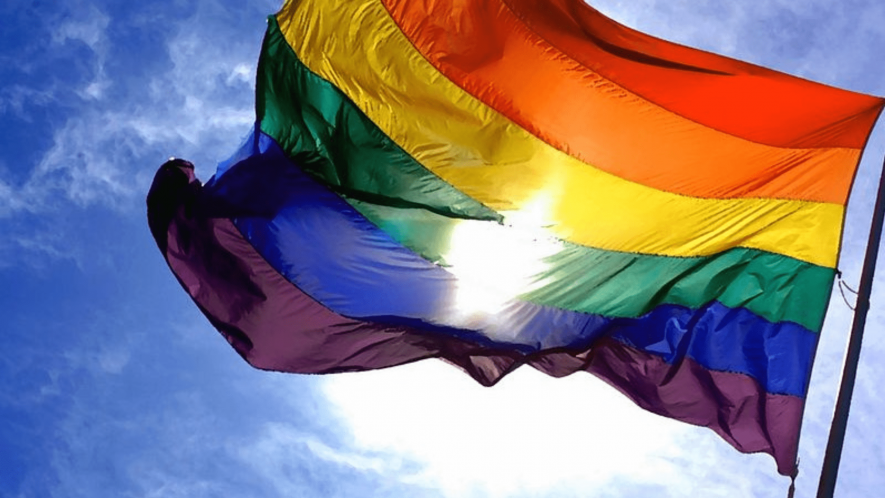
Representational Image. Image Courtesy: Wikimedia Commons
Introduction-
The South Asian lesbian, gay, bisexual, transgender, queer, and intersex (LGBTQIA+) population has looked to the Himalayan nation as a beacon of hope for their rights. In 2007, Nepal became the first nation in South Asia to formally recognize the third gender. Since then, the rights of gender and sexual minorities have gradually been realised and improved.
In a historic step, Nepal has become the first nation in South Asia to legalise same-sex unions, joining the tiny but increasing group of countries in the Asia-Pacific that have acknowledged this basic human right. The Supreme Court of Nepal issued a historic interim judgement on Friday ordering the Nepali government to formally recognise same-sex marriage, marking a significant step towards inclusivity and equality. This order by Justice Til Prasad Shrestha emphasises the necessity of significant changes to the current National Civil (Code) Act of 2017 (2074) provisions. According to the Family Law, marriage is defined as a relationship between “a man and a woman accepting each other as the husband and wife”. Adhip Pokharel, a Nepali national, and Tobias Volz, a German national, petitioned for this historic change. When Volz applied for a non-tourist visa to live in Nepal as Adhip Pokharel’s spouse in 2022, the couple—who had wed in Germany back in 2018—met with substantial challenges. The application was turned down by the authorities, who cited Nepal’s lack of legislative protections for same-sex unions as their justification. The pair was determined to stop this discriminatory practise, so they brought their case to the Supreme Court, which ultimately resulted in the issuing of an order granting the German citizen a non-tourist visa.
The legal journey to Same-sex marriages in Nepal
The lengthy and complex process that Nepal’s courts went through to recognise and legalise same-sex marriage is examined in this essay, along with the possible implications for an upcoming Indian Supreme Court decision.
On June 28 2023, the Supreme Court of Nepal made a historic decision that opened the door for marriage equality in the nation, making Nepal the first South Asian to legalize same-sex marriages and the fourth in the Asia-Pacific to do so. Justice Til Prasad Shrestha ordered the government to immediately begin registering same-sex marriages while working on legislation to modify the current law, despite the civil code currently defining marriage as being between a man and a woman
The Supreme Court of Nepal’s interim judgement calls for the creation of a “transitional mechanism” for the registering of weddings for the nation’s gender and sexual minorities. In addition, the directive instructs the PMCMN and the office of the Prime Minister to establish a “separate register of marriages” specifically for heterosexual and homosexual couples.
The interim order is based on Article 18(1) (right to equality) of Nepal’s 2015 Constitution and Section 69(1) (freedom of marriage) of The National Civil (Code) Act of 2017 which promote the recognition of marriage rights for people based on their gender identification and sexual orientation. It requests that the regulations pertaining to marriage and the registration of
Although there have been occasions when implementation has lagged, Nepal’s Supreme Court has won praise for its decisions in favour of LGBTQIA+ rights.
LGBTQIA+ individuals in Nepal have historically experienced significant discrimination and stigma. From their families, neighbourhoods, and places of employment, they frequently experienced hatred, rejection, and isolation. LGBTQIA+ people experienced verbal, physical, and emotional abuse, which had a serious negative impact on their mental and emotional health.
An important LGBTQIA+ rights group called the Blue Diamond Society (BDS) was established in Nepal in 2001. It was essential in spreading knowledge about LGBTQIA+ issues, offering support services, promoting legislative changes, and questioning social conventions. To provide a safe environment for LGBTQIA+ people, BDS ran community centres, outreach programmes, and pride marches.
Protests and demonstrations were organised by LGBTQIA+ activists in Nepal to demand their rights and oppose the country’s discriminatory laws and social mores. Although these activists encountered a lot of opposition and backlash, their work was crucial in spreading knowledge and rallying support for LGBTQIA+ rights.
The LGBTQIA+ population in Nepal was disproportionately impacted by the HIV/AIDS epidemic. Many LGBTQIA+ individuals were hesitant to seek healthcare treatments and support because of social stigma and discrimination. In order to address the confluence of LGBTQIA+ rights and public health, organisations like the Blue Diamond Society campaigned to give HIV/AIDS preventive information, testing, and support to LGBTQIA+ people.
Sunil Babu Pant Case- Catalyst for Change
A crucial court case, for LGBTQIA+ rights in Nepal was Sunil Babu Pant v. Government of Nepal[1]. The case was brought in 2007 by LGBTQIA+ activist and Blue Diamond Society founder Sunil Babu Pant, who questioned the validity of Nepal’s laws that make same-sex partnerships illegal.
The legal code of Nepal at the time, Section 377, used to criminalise “unnatural sexual intercourse” and target coerced same-sex partnerships. According to Sunil Babu Pant, this clause went against the Interim Constitution of Nepal’s guarantees of equality, non-discrimination, and privacy.
The Sunil Babu Pant v. Government of Nepal case was a significant advance for LGBTQIA+ rights. The LGBTQIA+ community was represented by the petitioners, who argued against Nepal’s discrimination against them and failure to recognise their preferred genders. The issuance of birth certificates, citizenship certificates, passports, voter identity cards that recognised their preferred genders, and the decriminalisation of consenting same-sex sexual activity were among the legal recognition and protections they sought.
The court ruled that under the different articles of the Constitution and the international agreements that Nepal has ratified, LGBTQIA+ people are entitled to equal protection and rights. According to the court, a person’s gender identity and sexual orientation are protected by their right to privacy and cannot be accessed without their consent. LGBTQIA+ people’s privacy was violated by treating their sexual behaviour as unnatural. A committee was established by the court with the mission of researching and defending the rights of minority groups, including the LGBTQIA+ community. The committee was tasked with advising the state on the adoption of suitable legal legislation to safeguard LGBTQIA+ rights. The court ordered the state to implement appropriate legal provisions to protect the rights in accordance with the committee’s recommendations. This verdict suggested the need for extensive legal changes to eliminate discrimination and give LGBTQIA+ people legal protection.
The Sunil Babu Pant case established crucial precedents for LGBTQIA+ rights in Nepal by reaffirming their legal equality, right to privacy, and dignity. Additionally, it emphasised the state’s responsibility to end prejudice and led to the formation of a committee to direct legislative improvements. These conclusions were important advancements in Nepal’s legal protection and acknowledgment of LGBTQIA+ rights. This verdict suggested the need for extensive legal changes to eliminate discrimination and give LGBTQIA+ people legal protection.
Early in 2015, a report from a government-appointed commission was released, effectively endorsing the legalisation of same-sex unions. However, neither had the same impact as the Supreme Court’s ruling establishing a third gender category. The third option was added to voter records by the Election Commission in 2010, and immigration papers quickly followed suit. Nepal was the first nation in the world to include a third gender in its federal census in 2011. The government also began issuing passports in 2015 that recognised three genders. In the same year, Nepal’s constitution was amended to specifically protect LGBT persons, making it the tenth nation in the world to do so.
Nepal’s progressive Constitution
On September 16, 2015, Nepal’s Constituent Assembly approved a ground-breaking new constitution following a protracted process of review and discussion. Having lost its monarchy in 2008, this was Nepal’s first constitution as a federal republic. Notably, the new constitution of Nepal is the first in Asia to specifically recognise the human rights of LGBTQ individuals.
Numerous sections of the constitution guarantee safeguards and rights for LGBT people. Article 12 gives people the freedom to indicate either their preferred gender identity—male, female, or other—on their citizenship documentation. The state and the judiciary are expressly forbidden from discriminating against gender and sexual minorities when enforcing the law under Article 18. Additionally, it enables the government to create specific legal provisions that develop, protect, and defend the rights of sexual and gender minorities as well as other oppressed and marginalised groups.
In order to encourage inclusiveness and representation, Article 42 also acknowledges gender and sexual minorities as a group with the right to participate in governmental processes and public services.
The Supreme Court of Nepal’s ground-breaking decision from December 2007 helped pave the way for this momentous development in Nepal’s constitution. The court’s ruling prepared the way for the inclusion of gender and sexual minorities’ rights in the nation’s constitution by laying the foundation for their recognition and protection.
Nepal’s constitution demonstrates a progressive position by specifically recognising the human rights of LGBT people and marks a significant turning point in the country’s advancement of equality and non-discrimination.
The court in the Sunil Babu Pant judgement also observed that the right to marriage is an “inherent right” of an adult based on free consent and will. However, it appears that the government’s legislative ineptitude in carrying out these court orders continues. In fact, there are some instances where the government has shown a reluctance to recognise the equal rights of the gender and sexual minorities, such as when it maintains a strictly gender-binary definition of marriage under Sections 67 (marriage deemed to be concluded) and 68 (marriage to be inviolable social bound).
The Supreme Court of Nepal has recently made decisions based on the principle of Stare decisis, citing other decisions it has made regarding LGBTQIA+ rights. The court strengthened the legal recognition of same-sex marriages and established a progressive trajectory in defending the rights of sexual minorities by being consistent and expanding on prior precedents.
Impact on Neighbouring countries and Global precedents
The Penal Code (Amendment) Bill, 2023, which aims to repeal legislation criminalising intimate conduct between consenting adults, was recently dismissed by the Supreme Court of Sri Lanka. The court found that the proposed legislation would guarantee everyone equal protection under the law regardless of sexual orientation, strengthen fundamental rights, and enable people to live with dignity. Recognising the right to privacy and liberty, the court emphasised that it is not the function of the government to regulate adult-to-adult private consenting sexual interactions.
This advancement in Sri Lanka is consistent with the historic decision rendered on March 22 by the Supreme Court of Nepal. The Supreme Court of Nepal recognised the equality of marriage and ordered the Ministry of Law and Justice to draught an equal marriage law or change current legislation to reflect this. Since the court’s ruling in Sunil Babu Pant v. Government of Nepal in 2007, which recognised the third gender legally and upheld the right to marriage as an inherent right based on free consent and will, non-heterosexual weddings have been accepted in Nepal.
The region’s neighbouring nations are significantly impacted by Nepal’s progressive position on LGBTQIA+ rights. The Supreme Court of India, a neighbouring country, decriminalised homosexuality in 2018 and is currently taking requests for non-heterosexual couples to be treated equally in marriage. The ruling in Nepal establishes a precedent and motivates comparable debates and legal issues in India.
The legalisation of gay marriage in Nepal also demonstrates the nation’s leadership in furthering the rights of South Asian gender and sexual minorities. The steadfast dedication of Nepal’s Supreme Court to equality and the affirmation of fundamental rights serves as a model for other nations in the region.
Conclusion
The legal environment is changing, and it is more crucial than ever to recognise LGBTQIA+ people’s rights. The courts’ emphasis on respect, confidentiality, and equal legal protection is consistent with universally accepted human rights tenets. A rising understanding that consenting private conduct between adults should not be criminalised can be seen in Nepal’s ruling and Sri Lanka’s dismissal of challenges to the repeal of discriminatory laws.
In conclusion, tremendous progress has been made in recognising and defending the rights of gender and sexual minorities in South Asia as seen by Nepal’s ground-breaking decision on marriage equality and Sri Lanka’s rejection of objections to the repeal of discriminatory laws. These developments may influence legal debates and reforms in neighbouring nations, promoting a more welcoming and egalitarian society for all.
LGBTQIA+ activists and advocacy groups in India find inspiration and a role model in Nepal’s legalisation of same-sex unions. The courts would be encouraged to fight for the same rights and official acceptance of same-sex unions in India. Legal advances in one nation can have an impact on judicial rulings and legal debates in neighbouring nations. Nepal’s legalisation of same-sex unions may add to the increasing number of worldwide legal precedents and justifications for marital equality. These precedents could be mentioned in Indian courts while a petition for same-sex unions is under consideration. When same-sex marriage laws are successfully implemented in Nepal, politicians in India may consider making similar changes. The Indian government may come under pressure as a result to deal with LGBTQIA+ rights problems more aggressively and take steps to legalise same-sex weddings or increase the legal status of same-sex partnerships.
(This article has been researched by Hasi Jain, an intern with the organisation.)
same-sex unions[1] Sunil Babu Pant v. Nepal Government, Writ No. 914 of the year 2064 BS (2007 AD)
Get the latest reports & analysis with people's perspective on Protests, movements & deep analytical videos, discussions of the current affairs in your Telegram app. Subscribe to NewsClick's Telegram channel & get Real-Time updates on stories, as they get published on our website.














